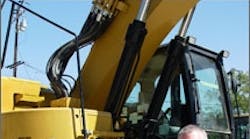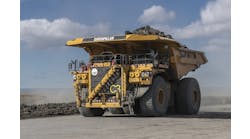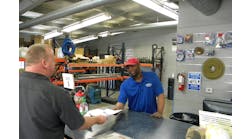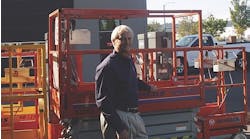When a 10-mile stretch of the 405 freeway on the west side of Los Angeles — known as the busiest freeway in the United States — was to be shut down for nearly 60 hours one weekend in July so an overpass could be knocked out, the fear of the whole metropolitan area of L.A. being locked in insufferable gridlock was so great the weekend was called “carmageddon.” Residents were advised to carry water, food and medicine with them if they ventured out that weekend into what was hyped as an apocalyptic event.
So what happened? Everybody stayed home and as a result, the freeways and streets of L.A. were almost empty.
But some of the employees of LaLonde Equipment Rental weren't home — they were on the jobsite. The heavy equipment rental specialist, that offers equipment with operators as well as bare, sent a wheel loader and an excavator to the carmageddon jobsite, arriving 12 hours in advance for inspection. One excavator, armed with a hydraulic breaker, worked on top of the bridge, while a wheel loader placed dirt under the bridge so falling chunks of concrete wouldn't damage the freeway below. The closely watched job — observed by thousands via television and live mini-cam — was pulled off without a hitch, in less time than expected. Monday morning the freeway was open and running normally.
“Carmageddon” was just one of many important jobs in Southern California that LaLonde Equipment Rental played a role in. The company helped update the international terminal at the Los Angeles Airport — which handles more origin and destination flights than any other terminal in the world — as well as helping expand the taxiways on the tarmac outside. It helped plan and build border fences along the U.S.-Mexico border, figuring out how to maneuver large excavators into steep canyons and ravines in terrain so rugged it took a full day just to get a machine in to the area.
Not a lot of people know it exists or how to pronounce its name, but family-owned LaLonde Equipment Rental has grown to become a major player in the ultra-competitive heavy equipment rental scene in California. And during the past few years, when the collapse of the Southern California housing market has been legendary, LaLonde has found a way to adapt and adjust and become one of the region's leading independent equipment rental players, narrowly missing being listed as one of the 100 largest rental companies in North America (it is listed at No. 101).
Now a second-generation rental company run by president Janelle Reusch and her brother Brian LaLonde, vice president, the company has about 80 pieces of earthmoving equipment, ranging from 17,000-pound mini-excavators to 175,000-pound excavators. LER employs 30 full-time operators, and about half of its rentals include operators, a unique niche in today's rental industry. It happened with the “carmageddon” project and it happens on many jobs — customers call and ask for operators because they have a level of experience and expertise that is highly desired.
“Our operators are probably the best in the industry,” says LaLonde. “They are usually better than the employees the contractor has, so our guys stay busy because customers call and request them by name every day. [The contractors on the 405 closure] were doing 12-hour shifts, so they wanted their guy on 12 hours and then have one of our guys, his name is Kirt, on for the other 12 hours.”
“It would have been next to impossible to try to find somebody with those types of skills at night under those conditions,” says Jason Groom, vice president sales/field operations. “That's what makes it unique for us; that's why they come to a company like ours.”
The experience level of the LaLonde operators is a major strength.
“Our average operator has over 30 years of experience and a lot of times they are also out there as a voice for the best application on how to get it done,” says Reusch. The highly skilled and experienced operators are also valuable to LaLonde Equipment because of their ability to represent the company on the jobsite. They essentially act as unofficial sales staff, developing relationships with contractors. The ability to advise and suggest on the best way to do jobs creates trust and an atmosphere of collaboration so that customers not only call back and ask for LaLonde to be present on the next job, but they'll ask for specific operators by name.
Casual conversation on the jobsite often leads to future rentals. “They are not all professional salespeople, but they are there having lunch with the guys,” says LaLonde. “And if someone says, ‘we need a wheel loader, they'll say ‘you want me to call the office and see if we have one available?’”
The presence of skilled operators also helps reduce service calls. LER has eight people in the shop and three mechanics with full-time service trucks. “We like our operators to have their own field trucks and bring extra items with them, so if a hose blows, or some other part needs to be replaced, they have the tools right then and there to change the hose or perform other repairs,” Reusch says.
The operators often bring attachments along that might be needed for a particular job so that additional rentals might develop as the job progresses.
Customers are attracted to LaLonde because of its highly skilled operators, but also because the company buys new equipment and has a relatively young fleet. In an era when many heavy-equipment jobs are done by government agencies, having new or almost-new machines with environmentally compliant engines is a great advantage.
For LaLonde Equipment, having newer equipment also rewards their operators and helps them to be more productive with well-maintained, almost-new equipment with enclosed cabs.
“That was a decision we made a couple of years back,” says LaLonde. “Our goal was to go to the best machines available and in Southern California, that's not very common because everyone has open-ROPS machines. For our employees, over their life, being in an environment that's air-conditioned, not breathing in the dust is going to be that much better for them.”
“We're constantly thinking about that operator in the seat, whether it's our operator or somebody else's operator,” adds Reusch. “What do they want to be comfortable to get the job done and be most productive?”
Although owners LaLonde and Reusch are relatively young, LaLonde Equipment Rental is not the new kid on the block. The company was founded by their parents Rudy and Mary Lou LaLonde in 1966 when Rudy, fresh out of the army, bought his first tractor and began operating the machine himself with a farm-disk attachment, plowing fields to keep the weeds down. He eventually got into grading work and began buying more machines and renting them.
Rudy and Mary Lou LaLonde didn't really want or expect their children to follow them into the equipment business. “They wanted us to be doctors and lawyers,” says LaLonde. “We ended up all coming back and all being in this industry. There are not really a lot of industries like this, it's a unique industry.”
In addition to LaLonde and Reusch taking over the family business, their three brothers — David, Darrin and Michael — are also in the construction business, with David and Darren running a grading company and Michael an equipment dealership.
Brian LaLonde grew up not particularly expecting to be in the equipment rental business. He studied business with a management degree at Loyola Marymount University on the west side of Los Angeles. “I definitely did not think I'd be where I am right now,” he says. “I thought I'd go through my four years at LMU and then interview with some Fortune 500 company and go to work.”
LaLonde graduated, started job-hunting and had a few interviews when the LaLonde Equipment accounts payable person went out on maternity leave. Once she came back, somebody else was taking a leave, so he took that person's spot and then somebody was needed in another area, and LaLonde kept filling in until he learned the whole business.
“I ended up taking everybody's spot and learning the whole business within a year and a half,” he says. “At that point they thought, ‘Maybe we can use him here, he's pretty versatile now.’”
Reusch, on the other hand says she knew for years she'd end up with the company. “I love tractors,” she says. “I love working in a male industry, I have four brothers myself. And there's just something about the competitive nature of construction, and what can you get done and how can you get it accomplished, or can you do it faster, better, more productive? I just love it.”
Reusch, a mother of three girls, also loves “to talk tractors with my daughters and talk about taking down bridges or building roads or just building the community around us.”
Groom, the third part of the LaLonde Equipment Rental management triumvirate, is not a family member but also comes from a construction equipment family.
“My dad didn't really want me to go into the construction business and I started my first two years at junior college studying drafting,” Groom says. “That was going to be my major but it wasn't something I got excited about.”
Soon, however, Groom, working for another equipment company, found he loved operating construction equipment and continued to work as an operator for 15 years. He eventually decided to look for opportunities on the management end and developed a friendship with Brian LaLonde and Reusch and joined the staff, helping develop the company in marketing, sales and field operations. Among the many roles Groom plays with the company is devoting a lot of time to lending his expertise to customers, often playing an advisory role as they figure out the best way to use the equipment and accomplish jobs — what machines, attachments, buckets or breakers to use for particular applications.
LaLonde Equipment's unique niche of specialized inventory also puts them into the position of being providers to their competitors. The national rental companies such as United Rentals, RSC Equipment Rental, Sunstate Equipment and others compete with LER but typically won't have the wide-ranging variety of heavy construction-oriented equipment and will therefore become customers as well. The local Caterpillar dealer sells to LaLonde and also rents from it.
“We're not likely to get into scissorlifts or light towers, at least not at this stage of the game, but we're going to be in our unique niche in that we have over 150 attachments,” LaLonde says. “You can't just get in the excavator business. We have attachments that cost over $100,000, so it takes a lot to build that up and get to where we are.”
The concentration on the specialized segment enables the LaLonde staff to deal with challenges unique to the niche. Some of the challenges faced by heavy-equipment rental specialists are common to other rental companies but more extreme. For example, permits are required on all deliveries because of the size of the delivery trucks, which are not allowed on Southern California freeways during commuting hours. “So often now it's a 7 o'clock meet in the middle of the center median of the freeway, and you have to be able to get the customer what they need when they need it because of closures and other regulations,” says Reusch, referring to situations where being a few minutes late might cause lengthy and costly delays.
Adjusting to recession
If one thinks of heavy construction equipment with an emphasis on home building, operating in the recent recession, one would assume a very difficult stretch of time for any equipment rental company, especially in hard-hit Southern California. However, for LaLonde Equipment, not only did it manage to adjust and find different types of jobs to keep it going, but the recession hit earlier than for most.
“We did have the same decline that everybody else had, being so heavily into housing, but it came early for us because with operated rental, we're the first people that they downsize,” says LaLonde. “A lot of operated rental is in demand when a contractor gets so busy he doesn't have enough personnel, so they go to an operated rental company. So we are early in the curve. We started seeing declines in 2006 and we bottomed out in 2008 and started to improve in 2009.”
Seeing the decline early in the housing construction cycle, LER shifted gears and found increased demand in airport work, freeway construction, ports, bridges and other segments.
With young and aggressive leadership, the LaLonde family is looking ahead to expansion opportunities. Like any relatively small company, LER has to consider if it has staff to manage a new branch plus be able to handle increased service costs.
The company could head north, perhaps to Bakersfield; south to San Diego; or east into the Inland Empire, all areas they are considering. “As we set up new regions, it's all about lowbeds and mechanics,” says LaLonde. Although the company has equipment rented out as far away as Sacramento, about 400 miles to the north, for the most part the company's reach is within Southern California, areas that can be driven to within a couple of hours.
LER also hopes to enlarge and expand the fleet with items such as large compaction rollers, wheeled excavators or other niche product markets. With the economy hopefully in an upswing as far as heavy equipment is concerned and a positive, aggressive management team, LaLonde Equipment Rentals appears to be in good shape for the coming years.






